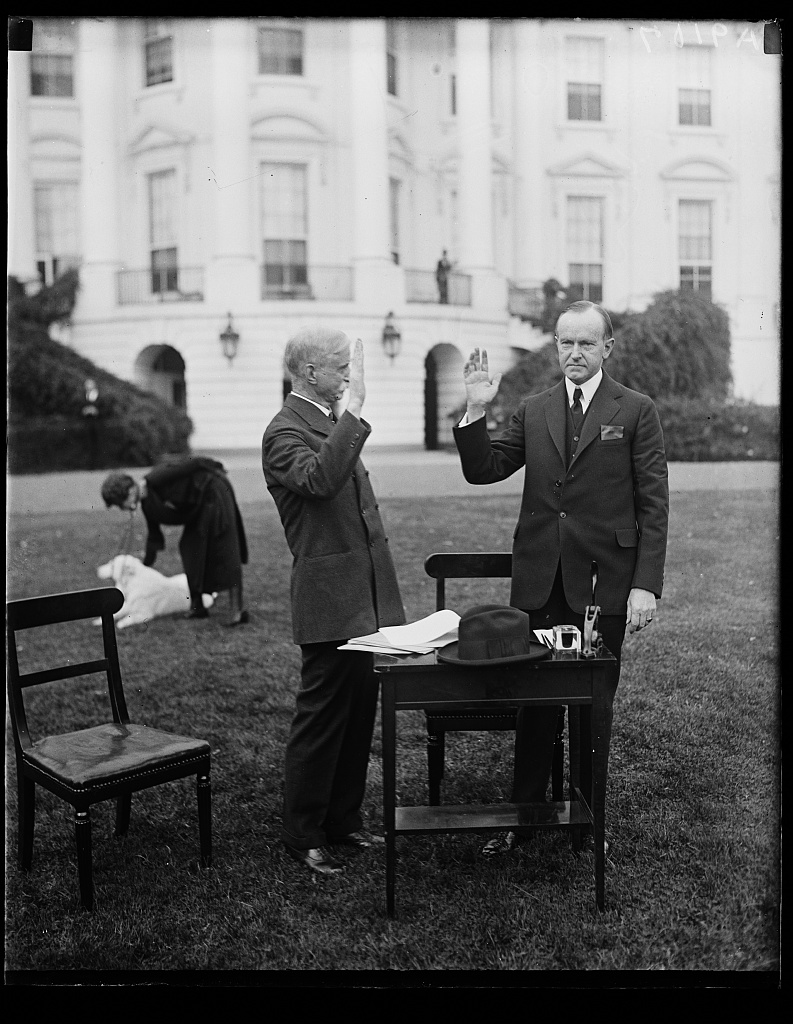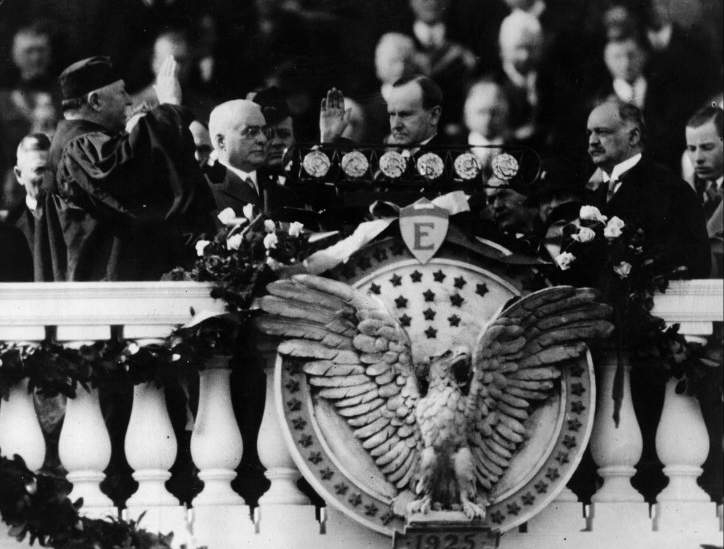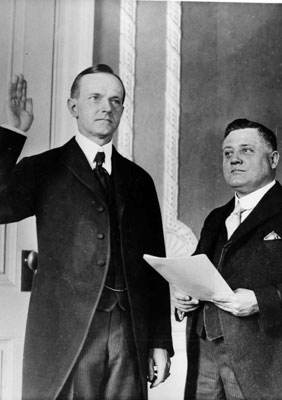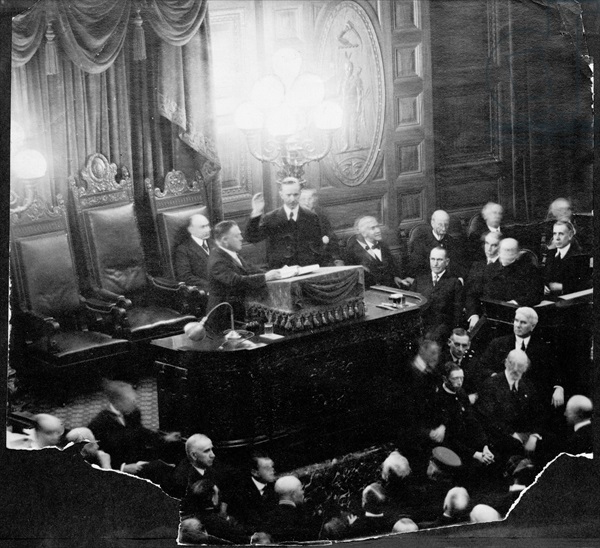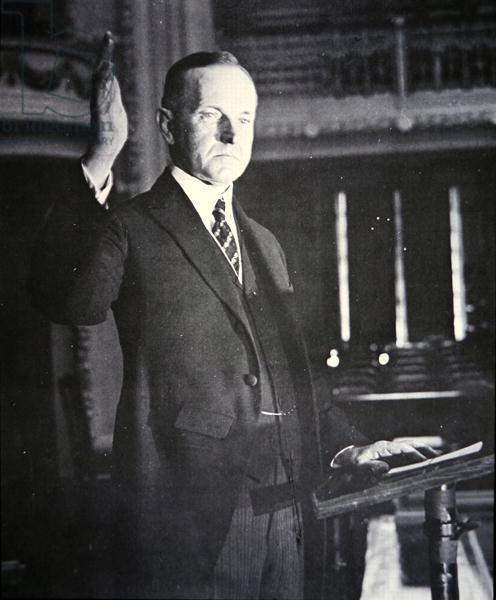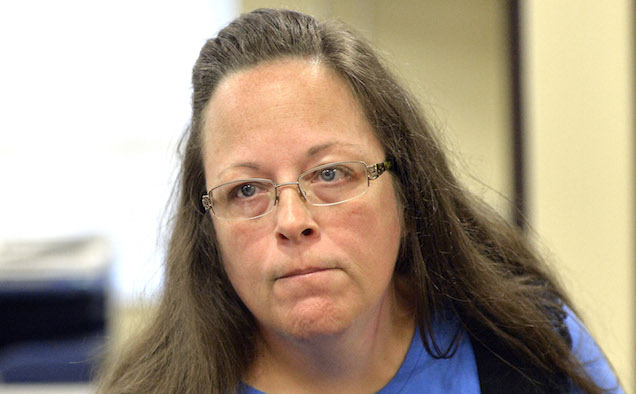
Rowan County Clerk Kim Davis listens to a customer following her office’s refusal to issue marriage licenses at the Rowan County Courthouse in Morehead, Ky., Tuesday, Sept. 1, 2015. Although her appeal to the U.S. Supreme Court was denied, Davis still refuses to issue marriage licenses. (AP Photo/Timothy D. Easley)
The recent conflict surrounding Rowan County clerk Kim Davis and U.S. District Judge David Bunning over compliance to the Obergefell decision goes beyond the mere politics of the moment. It is irrelevant that clerk Davis, jailed for 5 days while her office staff (expressing no such qualms as hers) issued marriage licenses to same-sex couples, is a Democrat, in whatever sense of the word. It is irrelevant that Judge Bunning is a Republican appointee, who has been involved in cases involving gays before (see the Gay-Straight Alliance case from 2003). It is even irrelevant that the Judge’s order rests upon the 5-4 Obergefell decision, a decision so shoddily argued it could make Dred Scott look prestigious. With the mere sweep of the gavel the interpretation of three-fifths of our state legal codes was changed overnight, thirty decisively passed popular initiatives overturned, and one decision of one Supreme Court justice has instantly cemented into the “law of the land” to which all owe total obeisance. We live now at the behest of judges, who appeal to the sanctity of oaths and the rule of law (as Judge Bunning has) but in doing so must supplant the source of legal authority. This reorders the freedoms to exercise and practice the dictates of one’s conscience to something trivial before that all-encompassing duty each individual owes the State. This requires we suspend our conscientious objections and implement whatever five lawyers are prepared to say the law is. Is law truly based on so tenuous and arbitrary a foundation?
Coolidge understood that for law to be lawful it had to rest on something more than mere earthly authority. Coolidge comprehended that law has its limits and the nature of obedience is something far more profound that whatever the current consensus of courts say it is. Courts are entrusted with the adjudication of rights, not the determination of issues, the interpretation of cases according to the laws as written, not as courts would like it to be. Laws mean nothing if they do not rest upon principles of eternal righteousness enacted by the people through their chosen representatives. Coolidge knew that majorities did not make law anymore than influential minorities can, however, they do but discover what is already anchored in the bedrock of God’s order. This latest instance of rule by judges is not merely equivalent to reducing the national speed limit to 45 or spelling out the allowable distance between fire hydrants and parking spaces. This is fundamentally transforming institutions government had no hand in creating in the first place, concerning the very essence of society’s first building blocks: the family, marriage, and personhood itself, which is also up for existential redefinition these days. The conscience is not the property of the State. Government has no more claim to ownership of an individual’s conscientious convictions than to deny life or liberty to whole classes of people by simply denying their humanity, be they in servitude to someone else or growing in the womb.
Coolidge put it this way. “Our conception of authority, of law and liberty, of property and service, ought not to be that they imply rules of action for the mere benefit of someone else, but that they are primarily for the benefit of ourselves. The Government supports them in order that the people may enjoy them.” Rules are there not to please a few at the expense of the rest but rather to sustain and protect everyone’s continued enjoyment and exercise of both rights and responsibilities. This is not honored when judges can simply throw out entire states’ propositions on a given rule or statute. Judges are no more at liberty to discard these ballot results than they are to overturn presidential, legislative, or gubernatorial outcomes they do not favor.
“Our American Government was the result of an effort to establish institutions under which the people as a whole should have the largest possible advantages. Class and privilege were outlawed, freedom and opportunity were guaranteed. They undertook to provide conditions under which service would be adequately rewarded, and where the people would own their own property and control their own government. They had no other motive. They were actuated by no other purpose. If we are to maintain what they established, it is important to understand the foundation on which they built and the claims by which they justified the sovereign rights and royal estate of every American citizen.” The notion that the “game” was rigged from the beginning is nothing more than projection, the artful sleight of hand that some current office holders perform to actually alter the arrangement of rights and duties in their own favor, with the inevitably proportionate loss of liberty and consent in the hands of the people.
Coolidge goes on, describing the vision of the Founding generation, “They did not deny the existence of authority. They recognized it and undertook to abide by it, and through obedience to it secure their freedom. They made their appeal and rested their cause not merely upon earthly authority, but in the very first paragraph of the Declaration of Independence asserted that they proposed ‘to assume among the powers of the earth a separate and equal station to which the laws of nature and nature’s God entitled them.’ And as they closed that noble document in which they submitted their claims to the opinions of mankind they again revealed what they believed to be the ultimate source of authority by stating that they were also ‘appealing to the Supreme Judge of the world for the rectitude of…their intentions.’ ” It was these same men and women, paying homage to the import of obedience, that furnished such rally cries as, “Resistance to tyranny is obedience to law,” as Coolidge noted on another occasion. By being true to conscience, they adhered to that highest of laws, appealing to God for the uprightness of their intentions.
To assert that Coolidge was inconsistent for appealing to something eternally transcendent while upholding Prohibition as the law does not hold. The 18th Amendment to the Constitution was properly approved by two-thirds of both houses of Congress and ratified by three-fourths of the states, as Article V of the Constitution stipulates. It is not analogous to claim that one judicial order or Supreme Court decision has superior authority to a constitutional enactment of the whole people. To insist that it does unravels the co-equal authority of each branch of the government not to mention the people’s sovereign rule. The Amendment rested on that direct sovereignty of the people in the various states, Obergefell and Judge Bunning’s order rest on one Supreme Court Justice’s opinion discounting thirty state initiatives and statutes contrary to it in order to reach the Court’s conclusion. This is parallel to the Massachusetts legislature in 1920 attempting to chip away at what the people of the states had approved by legalizing certain quantities of beer and wine, something Coolidge vehemently opposed. As Governor, he vetoed the measure with the rebuke, “My oath was not to take a chance on the Constitution. It was to support it…There can be no constitutional instruction to do an unconstitutional act.” The people had spoken. It was as much incumbent on the legislature and courts to abide by that authority as it is for each citizen.
When the people of the various states put in their charters the meaning of marriage, sovereign authority means it can only be changed through the same amendment process. Judges cannot supply what is not in the law without curtailing the far more fundamental protections actually in the Constitution: the free exercise of religion recognized in the First Amendment, for instance. Rightly did Coolidge declare, “The government of a country never gets ahead of the religion of a country. There is no way by which we can substitute the authority of law for the virtue of man.” “Real reforms,” he said, “will come as a result of our religious convictions, or they will not come at all.” The judicial or legislative attempt to force change leads invariably to the revolt of the soul, Coolidge warned. The government, indeed, the very authority of law, is nothing if it does not support the freedom to exercise religion unabridged, including the conscientious reservations that clerk Davis has exercised. The people of Kentucky may choose to change course but even they are bound by God’s world. The people cannot delegate to the federal Government what they do not possess themselves. Science may give the illusion that we can change personhood itself but not even the people can alter the laws of the Universe, however much some wish to do so. Judges do not have the sanction to change course for them, especially when they have already expressed their will. The judges last year who overturned the 2004 amendment to Kentucky’s constitution by her voters are flouting the very oath they took.
Coolidge continues, “When finally our Constitution was adopted, it contained specific provision that the President and members of the Congress and of state legislatures, and all executive and judicial officials, should be qualified for the discharge of their office by oath or affirmation. By the statute law of the United States, and I doubt not by all states, such oaths are administered by a solemn appeal to God for help in keeping of their covenants. I scarcely need to refer to the fact that the houses of the Congress, and so far as I know the state legislatures, open their daily sessions with prayer. The foundation of our independence and our Government rests upon our basic religious convictions. Back of the authority of our laws is the authority of the Supreme Judge of the world, to whom we still appeal for their final justification.” While the presence of daily prayer may have changed in many locales since Coolidge uttered these words, even today, the oath administered to federal judges (found in 28 U.S. Code § 453) reads: “I, ___ ___, do solemnly swear (or affirm) that I will administer justice without respect to persons, and do equal right to the poor and to the rich, and that I will faithfully and impartially discharge and perform all the duties incumbent upon me as ___ under the Constitution and laws of the United States. So help me God.” Judge Bunning, in reminding clerk Davis of her obligations, is equally bound by his own oath of office to the supreme law of the land, not merely its latest interpretive incarnation. To uphold Obergefell one must subordinate the Bill of Rights’ free exercise and the very principle that government operates only by consent of the governed. By turning the pinnacle of legal meaning and authority on its head to achieve a predetermined political goal is the antithesis of obedience to law. It is a repudiation of the Declaration for the sake of momentary victory, divesting the whole people of their rights for the sake of a part of the people. Coolidge warned that no minority is good enough and no majority is wise enough to trust with that kind of power. “We need the restraints of a written constitution,” he admonished.
By supplanting the right of the conscience to remain free and unfettered to the service of the State, wherever its interests lie at the moment, this does replace a written constitution with an unwritten, malleable, and ephemeral one. Without the anchor of objective meaning, everything is up for grabs. Supreme law can be downgraded to whatever the judge decides it to be, and conscience treated like it were nothing more important than some municipal code forbidding animals in certain residential developments. In the end, obedience to the wishes of a few to requirements clothed with the sanctity of law but lacking its substance is not obedience at all. It is a mockery of law and authority and will eventually consume the very institutions that presumed to legislate where no authority is given.
Coolidge put it this way, “The Constitution and laws of our country are adopted and enacted through the direct action of the people, or through their duly chosen representatives. They reflect the enlightened conscience of our country. They ought always to speak with the true and conscientious voice of the people.” Coolidge does not say “the voice of the judges.” Their consciences are not to be reflected in the laws and Constitution. This authority was deposited in the people. President Coolidge goes on to say, “Such voice [of the people] has from time immemorial had the authority of divine sanction. In their great fundamentals they do not change. As new light arrives they may be altered in their details, but they represent the best that we know at any given time.”
The great fundamentals are immutable. Marriage and the individual’s conscience, predating the earliest human government, are things outside the reach of all mortal institutions. They no more belong to any court than they do any legislature. Not even the sovereign people of a nation can vote to overturn fundamentals like these. Having upheld their sanctity from government interference, however, as the federal and most state constitutions have, no official (from county clerk to federal judge) is empowered to replace or abolish them with values not only contrary to the ratified voice of the people but in willful defiance of it.
“To support the Constitution, to observe the laws, is to be true to our own higher nature. That is the path, and the only path, toward liberty. To resist them and violate them is to become enemies to ourselves and instruments of our own destruction. That is the path toward servitude. Obedience is not for the protection of someone else, but for the protection of ourselves. It needs to be remembered that it has to be secured not through the action of others, but through our own actions. Liberty is not collective, it is personal. All liberty is individual liberty.” Refusing to countenance any place for individual conscience in the administration of law, the new regime imposes a religious test to officeholders after all, contrary to Article VI: a test mandating the suspension of conscience in order to implement whatever the courts dictate, whatever violence it inflicts on the conscience of the individual. What kind of law must it be when denial of conscience becomes the prerequisite to obedience, or even the simple faith to one’s oath? At that point, we are no longer in obedience to the rule of law, but to the desires and values of other men, using the strength of legal authority to co-opt our compliance. That is diametrically opposed to the obedience we owe law, resting on eternal foundations, as Coolidge understood it. It adopts in its place a suppression of each person’s internal light of conscience, and rather than lifting and informing it, shackles it in ignorance, enslaving the very mind and soul to condone whatever a government wishes to do. Just as Coolidge foresaw, it leads each person to become his or her own self-enemy, ensnared in the thicket of our own betrayal of righteousness, until it destroys us completely.
